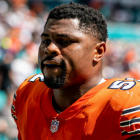The NFL's financial landscape is being assessed through awards for the sixth-straight year on CBSSports.com, now that the regular season has ended. These awards differ from the traditional NFL honors because they are from an economic perspective, emphasizing 2018 veteran acquisitions. Players acquired by trades or in free agency can have a tremendous impact on an NFL team's fortunes. Rookies weren't given any consideration because their salaries are a function of draft position and the rookie wage scale. The same applies to players on restricted free-agent tenders, since the amounts are set by the NFL's Collective Bargaining Agreement.
Most Valuable Acquisition
Mack made an immediate impact after the Bears gave up their next two first-round picks to get him from the Raiders on Labor Day weekend and gave him a blockbuster contract in the process. He became the league's highest-paid non-quarterback with a six-year, $141 million contract extension averaging $23.5 million per year. Mack has the fourth-most overall guarantees ever in a NFL contract at $90 million, of which $60 million was fully guaranteed at signing. Both are records for non-quarterbacks.
Mack won NFC Defensive Player of the Month honors for September after generating five sacks, forcing four fumbles and returning an interception for a touchdown in the season's first four games as the Bears got off to a 3-1 start. The 2016 NFL Defensive Player of Year's dominance was the driving force behind the Bears capturing the NFC North and becoming the NFL's most formidable defense. The 12.5 sacks Mack had in 14 games were one-half fewer than the 13 sacks his old team, the Raiders, had this season.
Runner Up: Drew Brees, QB, Saints
Stream Saturday night's and Sunday's playoff games on fuboTV, try it for free, and stream the CBS games on CBS All Access.
Least Valuable Acquisition
The Cardinals signed Bradford to a two-year, $40 million contract despite the QB playing only six quarters of football in 2017 due to a balky left knee that had previously suffered two ACL tears. The $15 million fully guaranteed at signing consisted of a $10 million signing bonus and a $5 million base salary. The deal also contained $5 million of 46-man per-game active roster bonuses ($312,500 each game) for this season, which was the largest ever in an NFL contract, because of Bradford's injury history. The per-game amount was payable only if Bradford was on the 46-man active roster for that particular game.
Bradford didn't perform anything like he did in the 2017 season opener against the Saints, which earned him NFC Offensive Player of the Week honors. He was benched three games into the 2018 season for rookie Josh Rosen, the 10th-overall pick. Bradford wasn't active on game day for the other five games he was with the Cardinals before his release in order to limit his roster bonus collection. Bradford made $15,937,500 for his eight-game stint with the Cardinals, where he was on the field for only 135 of Arizona's 942 offensive snaps (14.3 percent). He didn't sign with another NFL team after his release.
Runners Up: Vontae Davis, CB, Bills; Allen Hurns, WR, Cowboys; Carlos Hyde, RB, Browns/Jaguars; Tyrod Taylor, QB, Browns
Offensive Signing of the Year
Ebron signed a two-year, $13 million contract (worth up to $15 million through incentives) with Indianapolis after the Lions released him in early March to prevent his $8.25 million 2018 fifth-year option from becoming fully guaranteed. The 2014 first-round pick had a much bigger role than anticipated because injuries to tight end Jack Doyle, who played in last season's Pro Bowl, limited him to six games in 2018. Ebron set career highs of 66 catches, 750 receiving yards and 13 touchdown receptions, which were tied for the NFL's second most. His 14 total touchdowns were tied for fifth in the NFL. Ebron earned his first Pro Bowl berth this season.
The Colts may have opted to designate the 25 year old as a franchise player without a 2019 contract year in place. The 2019 tight end number is expected to be in the $10.5 million neighborhood. The four-year, $32 million contract (worth to $34.8 million with incentives) containing $22 million of guarantees Trey Burton received from the Bears during free agency probably would have been Ebron's salary floor if he were able to enter the open market in March.
Runners Up: Drew Brees, QB, Saints; Brandin Cooks, WR, Rams
Defensive Signing of the Year
Fuller validated Chicago's decision to match the four-year, $56 million offer sheet he signed with the Packers after being designated a transition player for $12.971 million. He tied for the NFL lead with seven interceptions this season. Fuller paced a secondary that picked off an NFL-high 27 passes and held opposing quarterbacks to a league-low 72.9 passer rating. He was selected to the Pro Bowl for the first time. Fuller has also been named a second-team All-Pro by Pro Football Focus (PFF).
The offer sheet worked out to Chicago's advantage, rather than letting Fuller hit the open market or giving him a $14.975 million franchise tag. In either of those cases, a long-term deal likely would have had significantly more that $18 million fully guaranteed in the matched offer sheet. By contrast, Trumaine Johnson, who signed the most lucrative free agent cornerback with the Jets at $72.5 million for five years, had $34 million fully guaranteed and $45 million in overall guarantees.
Runner Up: Demario Davis, LB, Saints
Biggest Steal
It took a season-ending knee injury to 2018 second-round pick Derrius Guice for the Redskins to sign Peterson to a one-year contract at his $1.015 million league-minimum salary without any incentives late in the preseason. No other teams had expressed serious interest in Peterson in the previous five months since free agency started. The assumption was Peterson had very little gas left in the tank after two injury-plagued and unproductive seasons.
The Redskins never imagined Peterson would have such a big offensive impact. The 33 year old became the oldest to rush for 1,000 yards during a season in 34 years while running behind an offensive line that was decimated by injuries. Peterson was one of eight running backs to crack the 1,000 yard mark this season. Peterson's 1,042 rushing yards were eighth in the NFL.
Runner Up: Pierre Desir, CB, Colts
Best Use of a Contract Year
Ford follows in the footsteps of Cowboys defensive end Demarcus Lawrence, who won this award last season. He is an edge rusher who had a breakout season with an expiring contract following an injury-plagued year.
Ford's six sacks and four forced fumbles in five October games helped him garner AFC Defensive Player of the Month honors. His 78 quarterback pressures were third in the NFL and first among edge rushers. Ford also tied for eighth in the NFL with a career high 13 sacks. The 2014 first round pick is a prime candidate for a franchise tag because his 2018 play is an outlier and the immense importance of players who can pressure opposing quarterbacks. The linebacker number is expected to be roughly $15.6 million, assuming the 2019 salary cap is in the $190 million range.
Ford would have no shortage of suitors if the Chiefs let him hit the open market. As a highly-productive pass rusher in his prime, Ford would quickly join Rams interior defensive lineman Aaron Donald, the reigning NFL Defensive Player of the Year, and Bears edge rusher Khalil Mack, who won the award in 2016, in the $20 million-per-year non-quarterback club.
Runners Up: Frank Clark, DE, Seahawks; Trey Flowers, DE, Patriots; Jason Myers, K, Jets
Worst Use of a Contract Year
Benjamin was best known in 2018 for curiously blaming Panthers quarterback Cam Newton during the preseason for not being as productive as Odell Beckham, Jr., Brandin Cooks and Mike Evans, who were also taken in the first round of the 2014 draft, during his three-and-a-half seasons in Carolina. The 28th-overall pick in 2014 was a major disappointment after being traded to the Bills in the middle of the 2017 season. Benjamin caught only 39 passes for 571 yards with two touchdowns in 18 games with Buffalo before his release in early December. He signed with the Chiefs a couple days later to provide wide receiver depth because of Sammy Watkins' foot injury, which has kept him out of action the last six weeks. Although there isn't going to be a particularly strong group of wide receivers available in the 2019 NFL draft, look for Benjamin to sign a one-year prove-it deal to try to re-establish his value.
Runners Up: Tyler Eifert, TE, Bengals; Ereck Flowers, OT, Giants/Jaguars; David Irving, DL, Cowboys
Best Contract Year Extension (for a team)
Hunter sold himself short by signing a five-year, $72 million extension with $40.007 million of guarantees during the offseason. The contract runs through the 2023 season. Hunter would have been facing a 2019 franchise tag in the $17.3 million range by merely duplicating his 2017 performance, which he has easily exceeded. Hunter tied for fourth in the NFL with 14.5 sacks. Since Hunter had a career year while playing out his contract, he would have been in a position to potentially leverage the franchise tag into a long-term deal averaging in the $20 million-per-year neighborhood. Hunter's deal contains $1 million in annual base-salary escalators for sacks. His 2019 base salary increased by $500,000 once he got to 13 sacks. It's just a matter of time before Hunter is drastically underpaid compared to his contemporaries (Frank Clark, Jadeveon Clowney, Dee Ford, Demarcus Lawrence, etc.) despite the escalators with the salaries for top pass rushers expected to explode over the next couple of years.
Runner Up: Shaq Mason, OG, Patriots
Worst Contract Year Extension (for a team)
The Jaguars going all-in on Blake Bortles after an unexpected playoff run to the AFC Championship Game last season backfired spectacularly. Bortles was given a two-year, $34.497 million extension (worth up to another $12.5 million through salary escalators and incentives) with $26.5 million fully guaranteed instead of allowing him to play the 2018 season on his $19.053 million fifth-year option. He took such a step backward after being an effective game manager in 2017 that he was benched four games in early December for Cody Kessler, who didn't fare any better, until the regular-season finale.
The Jaguars would have been able to walk away from Bortles after this season without any salary-cap consequences if he were still playing under his fifth-year option. Because of the extension, the Jaguars could have as much as $16.5 million in dead money by releasing Bortles during the offseason. This stems from his $6.5 million salary guarantee in 2019, which has an offset, and $10 million of signing-bonus proration from his 2019 and 2020 contract years.
The cap hit for releasing Bortles could be taken over two years by using a post-June 1 designation. Jacksonville would be required to carry Bortles' full $21 million cap number until June 2, even though he would no longer be a part of the roster with a release in this manner. The non-guaranteed $7.5 million of Bortles' $14 million 2019 base salary would come off the books at this time, leaving the Jaguars with $11.5 million of dead money. There would be a $5 million cap charge in 2020 relating to the $15 million signing bonus Bortles received in the extension. This is because the acceleration of the $5 million in signing bonus proration from Bortles' 2020 contract year would be delayed with use of a post-June 1 designation.
Bortles' $16 million and $18 million salaries in the next two years as well as his inconsistency make him practically untradeable. The offset will lessen the 2019 cap obligation but probably not by the full $6.5 million guarantee because Bortles signing a 2019 contract with another team for that amount or more would be surprising, given how he performed this season.
Runners Up: Ricardo Allen, S, Falcons; David Johnson, RB, Cardinals


































